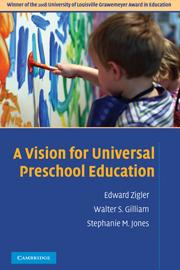Book contents
- Frontmatter
- Contents
- List of Contributors
- Acknowledgments
- Introduction
- 1 The Universal Preschool Movement
- 2 School Readiness: Defining the Goal for Universal Preschool
- 3 Economic Returns of Investments in Preschool Education
- 4 The Need for Universal Prekindergarten for Children in Poverty
- 5 The Need for Universal Preschool Access for Children Not Living in Poverty
- 6 Program Quality, Intensity, and Duration in Preschool Education
- 7 A Whole Child Approach: The Importance of Social and Emotional Development
- 8 Parent Involvement in Preschool
- 9 Professional Development Issues in Universal Prekindergarten
- 10 What the School of the 21st Century Can Teach Us about Universal Preschool
- 11 A Place for Head Start in a World of Universal Preschool
- 12 A Model Universal Prekindergarten Program
- Summary and Recommendations
- Index
Summary and Recommendations
Published online by Cambridge University Press: 05 June 2012
- Frontmatter
- Contents
- List of Contributors
- Acknowledgments
- Introduction
- 1 The Universal Preschool Movement
- 2 School Readiness: Defining the Goal for Universal Preschool
- 3 Economic Returns of Investments in Preschool Education
- 4 The Need for Universal Prekindergarten for Children in Poverty
- 5 The Need for Universal Preschool Access for Children Not Living in Poverty
- 6 Program Quality, Intensity, and Duration in Preschool Education
- 7 A Whole Child Approach: The Importance of Social and Emotional Development
- 8 Parent Involvement in Preschool
- 9 Professional Development Issues in Universal Prekindergarten
- 10 What the School of the 21st Century Can Teach Us about Universal Preschool
- 11 A Place for Head Start in a World of Universal Preschool
- 12 A Model Universal Prekindergarten Program
- Summary and Recommendations
- Index
Summary
Because we want this book to be immediately useful to busy people – policy makers and their staffs, education administrators, and others trying to make universal preschool happen – here we provide a summary of the previous pages. We do hope everyone will make time to read the whole book, which describes the empirical and theoretical underpinnings of our recommendations for a universal preschool education system.
Early childhood education is considered by many to be a cornerstone for American education reform. The Goals 2000: Educate America Act, which guided education reform in the United States during the 1990s, specified school readiness as the very first goal: “By the year 2000, all children in America will start school ready to learn.” The legislation articulated that the goal was to be achieved through universal access to “high-quality and developmentally appropriate preschool programs”, parent involvement, and attention to children's physical and mental health. Five-plus years after our deadline, although progress has been made, we remain woefully short of this vision.
Significant research over the past 40 years has demonstrated the positive effects of high-quality preschool programs. Benefits include:
Improved school readiness
Reduced grade retention
Reduced need for costly remedial and special education services
Improved educational test scores
Increased high school graduation rates and postsecondary education
Increased employment rates and family income
Reduced criminal activity and likelihood for incarceration
Reduced dependence on welfare
These findings derived mainly from studies of model early intervention programs that maintained very high quality and were funded well enough to pay for it.
- Type
- Chapter
- Information
- A Vision for Universal Preschool Education , pp. 262 - 270Publisher: Cambridge University PressPrint publication year: 2006



